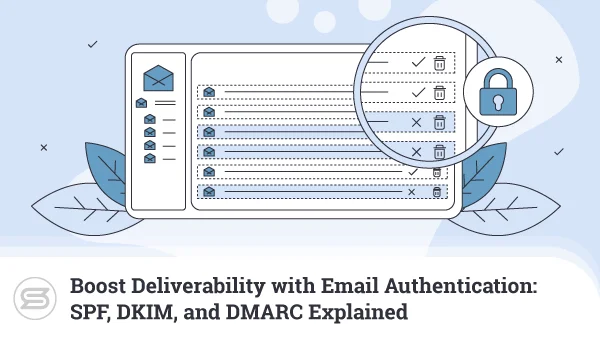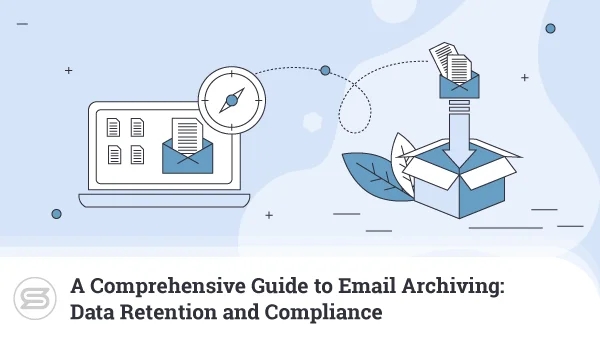What is Shared Email Hosting?
Email is vital to every business, regardless of its size. It’s how we communicate with clients, partners, and colleagues.
In today’s world, email hosting has become an essential requirement for businesses to operate smoothly. However, choosing the right hosting type that meets your needs can take time and effort, given the many available options on the market.
This blog post explores shared email hosting in depth. We will cover the service’s benefits and drawbacks and show you how it differs from dedicated email hosting. You will also learn whether shared solutions for email are the right choice for your small business in the first place and how to configure them without any previous experience.
Why Do You Need Email Hosting?
Before we delve deeper, it’s a good idea to briefly discuss the hosting business as a whole. Hosting is a service that gives you access to hardware resources required to run a website, send and receive emails, or both.
A web host owns a fleet of servers it rents to customers. Every server has enough storage for website files, the software required to run all the necessary scripts, and the facilities needed to process email messages. Typically, web hosting plans provide hosting and email services within the same package. They usually come with a web hosting control panel – a management platform that helps with website creation and email processing.
However, providers also offer services optimized solely for email communication. They don’t allow you to build a website, but you can still access advanced email management tools that help you create new inboxes, set up filters, redirects, automatic responses, etc. These premium email hosting services are aimed at customers who don’t have a website or want to host their emails separately. Some may be wondering why this type of service is even necessary.
After all, you can create as many inboxes as you want and manage incoming and outgoing emails with free email service providers like Yahoo or Gmail. However, a free email account gives you a @gmail.com or @yahoo.com address. These are hardly ideal for business communication. If a partner or potential client sees you sending messages from a Yahoo inbox, they’ll probably think you’re not taking your job seriously. In this day and age, this just isn’t good enough.
Google can help you set up email accounts with your custom domain. You can use its Workplace packages and create professional email addresses for all your employees through the Gmail interface.
The problem is, these plans start at as much as $6 per month per user. By contrast, the cost of the cheapest paid email hosting services is similar, but even at the lowest end of the scale, you can get ten inboxes associated with your custom domain and a lot more storage.
Even if you’re running a small business with only a few employees, the difference will be significant. It’s not like you will be getting anything less with the web hosting email service.
Sure, you won’t use the familiar Gmail interface, but most providers have a webmail feature that allows users to check their emails through all popular web browsers. Of course, the option to use an email client for instant access to your inbox is also available, and business email hosting providers put a lot of effort into ensuring that setting these applications up is as easy as possible.
You may not rely on the servers of a tech giant like Google, but recent cloud hosting innovations mean that reliability shouldn’t be a problem even with smaller web hosts.
What is Shared Email Hosting?
Shared email hosting is a service setup where a single server hosts email accounts belonging to multiple individuals and organizations. Shared email hosting clients can still create custom email addresses associated with their domains. They just don’t have their own email servers and instead share the resources provided by a single physical machine.
Using it is anything but complicated. After you create your email hosting account, you’ll receive a welcome email with the NS settings you need to set. You must then go to your domain host, configure them, and wait for the changes to propagate globally.
There is a graphic user interface and a control panel with all the tools you need to create and manage email accounts, as well as stats regarding your web hosting account’s resources and usage.
All in all, from a user’s perspective, there’s nothing to suggest that multiple hosting clients utilize the same server. At the same time, the setup has a few distinct advantages.
Benefits of Shared Email Hosting
Shared email hosting offers several benefits, making it an attractive option for team collaboration and individuals.
Let’s see why:
- It is a cost-effective solution compared to dedicated email hosting, as multiple users share the same server and resources.
- Paid email hosting services usually offer a range of free features, such as spam filtering and virus protection, reducing the risk of cyberattacks.
- Team members can access their inboxes from any device with an internet connection, making remote work or travel convenient.
- Email hosting providers often include collaboration tools in their solutions that improve internal communication, increasing productivity and efficiency.
Drawbacks of Shared Email Hosting
While shared email hosting may seem like an affordable and convenient option, there are some drawbacks to consider before making the switch.
- One of the biggest concerns is security. With multiple users sharing the same server, a single compromised account or email address could risk all other users’ emails and data.
- Any online hosting service based on a shared environment suffers from slower performance during peak usage periods, which impacts productivity and could lead to less efficient communication within and outside your business.
- A shared server IP can easily fall into a blacklist, affecting the deliverability of your own emails.
It’s essential to carefully weigh these drawbacks against the cost savings and consider whether it’s a good option for your small business.s.
Differences Between Shared and Dedicated Email Hosting
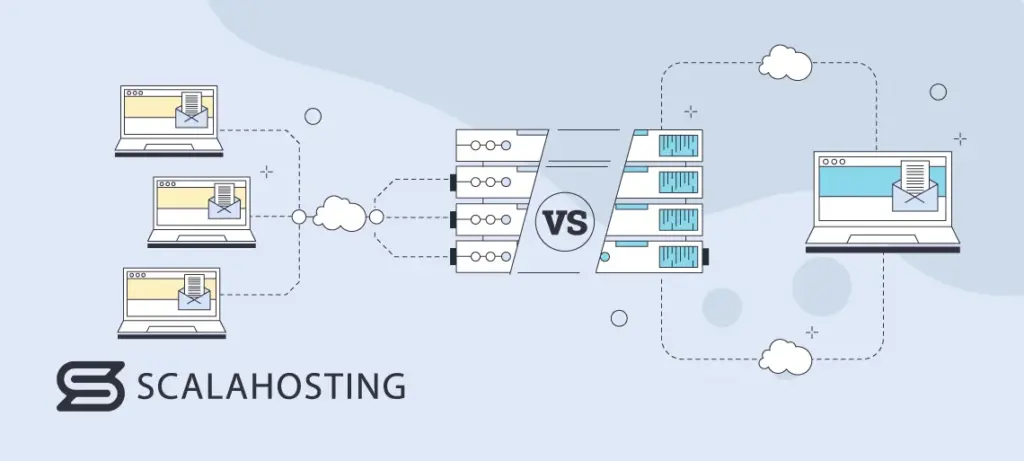
The purpose of all types of professional email hosting is the same – allowing you to create and manage inboxes using your own domain address. However, different services have different means of providing all that’s required to power your professional email correspondence.
With the shared plans we discussed in the previous section, multiple customers have access to the same pool of CPU and RAM. This allows hosting providers to offer professional email services, costing as little as a few dollars per month. However, for some organizations, sharing the same hardware resources with other businesses isn’t a suitable setup.
That’s why dedicated email hosting services exist. This time, you’re not sharing hardware resources with anyone. Instead, you have a separate server responsible solely for your email communication.
More often than not, the dedicated email hosting service is a virtual server you hire and use for your emails. Occasionally, it could be a physical machine, but in both cases, you have an entire server under your control. It has its own hardware configuration, and its resources are available to you 24/7. Your email server also has its own IP reserved for you.
The prerequisites for using a dedicated email hosting account are the same as those for the shared service. You need an active domain pointing at your server to use the service. If you use it for a website hosted on a different account, you’ll probably need to change its MX records. Your host should be able to give you more information on that.
It should also be able to assist you with a brand new domain registration in case you’re just getting started. Many hosting companies may even include it for free for the first year as part of your dedicated email hosting plan.
Once your server is up and running, a control panel helps you set everything up. If the server is dedicated to emails alone, the list of features is likely to be pretty similar to what you get with a shared email hosting account, though you’ll obviously have fewer limitations in terms of the number of inboxes you can create, the domains you can host, etc.
Obviously, because there is only one client on the server, dedicated email hosting is more expensive than shared solutions.
Advantages of Dedicated Email Hosting
Dedicated email hosting offers several advantages over shared hosting.
- You can customize your environment to meet your specific needs and have complete control over your email server.
- Dedicated hosting provides better security and privacy than shared hosting, ensuring that sensitive data remains safe.
- You’ll have access to more resources, such as storage space and bandwidth, improving the performance of your email server.
- As the sole dedicated server client, you’ll likely experience a faster response time from the help desk if mailbox problems arise.
If you require high reliability and uptime for your email communications or handle sensitive data, dedicated hosting is one of the best options for your business.
Disadvantages of Dedicated Email Hosting
While dedicated email hosting offers enhanced control and security, it comes with its own set of drawbacks.
- The cost of dedicated hosting can be significantly higher than shared hosting.
- Setting up and maintaining a dedicated server requires technical expertise.
- You are responsible for your server management, which can be time-consuming and complicated.
Is Shared Email Hosting Right for Your Small Business?
Evaluating your specific needs is essential when deciding which email solution is right for your small business. While shared hosting is a cost-effective way to share resources on the same server, companies with high email traffic or sensitive data often need something much better (especially ecommerce ones).
Consider the pros and cons of each option and weigh them against your business’s budget and unique requirements before making a decision that will impact your communication system.
Key Features and Considerations When Choosing Email Hosting
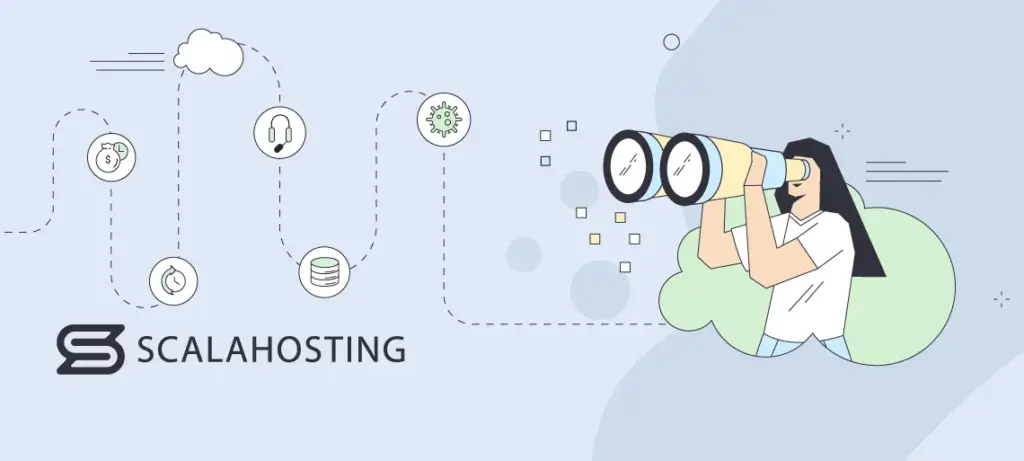
When choosing a shared email hosting service, there are a few key aspects to consider.
They are the following ones:
- Look for a provider with ample storage space, reliable uptime, and easy-to-use management tools.
- Choose a plan that fits your budget and offers scalability as your business grows.
- Consider the provider’s reputation and customer support options to ensure you have assistance when needed.
- Check for added features such as spam protection, virus scanning, and backup options to ensure your email communication remains secure and uninterrupted.
Considering these factors, you can confidently choose a host that suits your business needs.
ScalaHosting Dedicated Email Hosting
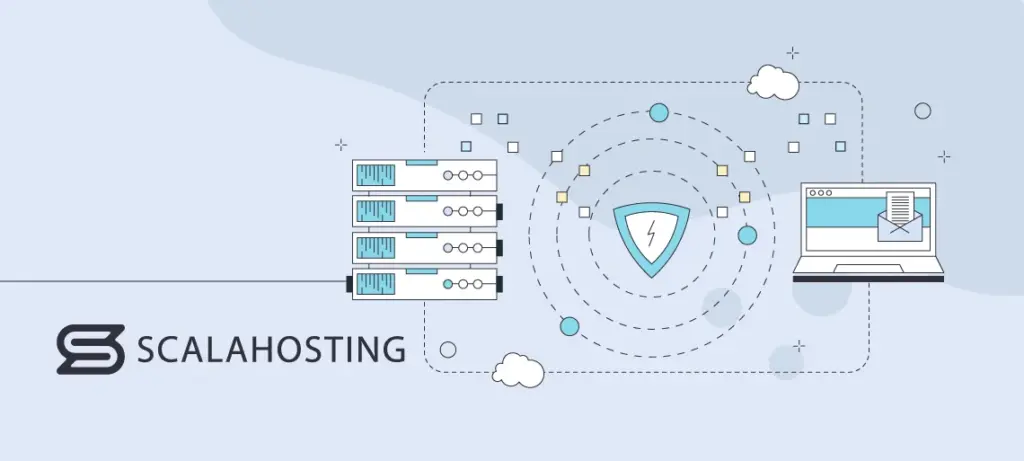
Let’s say you’ve settled on dedicated hosting and are now looking for the best solution. (Lucky you!) With ScalaHosting’s dedicated email hosting plans, users get their own server and resources for optimal performance and privacy.
Advanced spam filters and virus protection are also included to ensure your emails are always safe. And with a 24/7 customer support team tacked onto our AI-enhanced, real-time security protocol, you can rest assured that any issues or concerns are met efficiently and precisely.
Consider our dedicated email hosting if you’re looking for a reliable, secure, and customizable option for your business messaging needs.

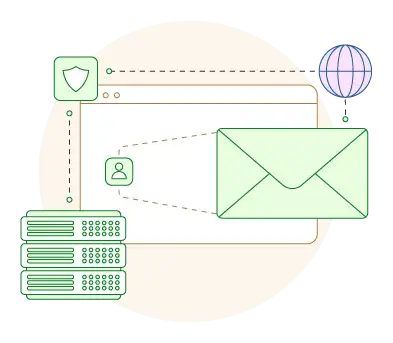
Frequently Asked Questions
Q: What is email hosting?
A: Essentially, an email hosting provider rents you some server space and gives you the tools required to set up and use email accounts under your own domain name. Instead of a Gmail inbox, for example, you’ll have a professional email address for your business communications, and you’ll be able to access and send messages both through web browsers and via email clients.
Q: How does shared email hosting differ from other types of services?
A: Shared email hosting is built so that multiple users share the same server and resources for their email accounts. With all other solutions, a single client gets exclusive use of server resources and can operate them as they see fit.
Q: Are there any security risks associated with shared email hosting?
A: Yes, there are some security risks associated with shared email hosting. Multiple users sharing the same server can increase the risk of hacking or viruses through a neighboring account. Choosing a reputable, dedicated hosting provider with proper security measures is important to mitigate these risks. Regular backups and updates can also help protect your data. It is essential to safeguard your email accounts and ensure your messages always reach their destination.

